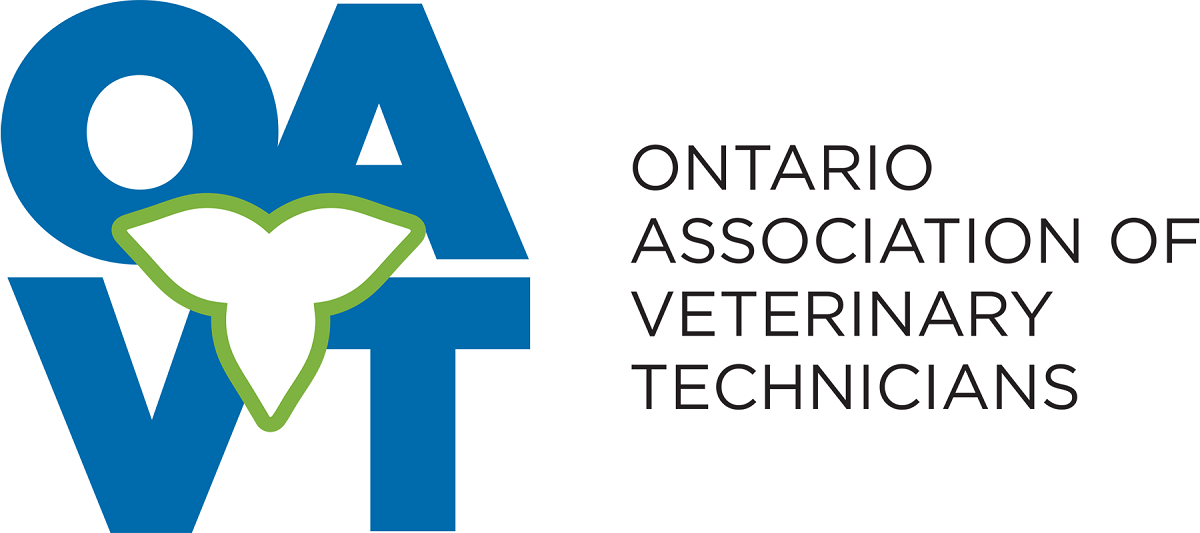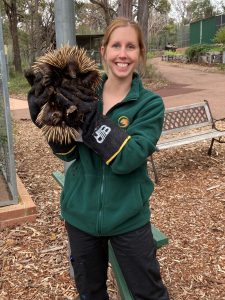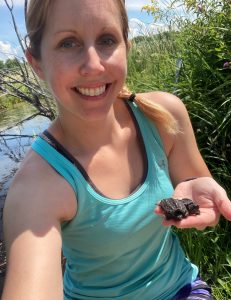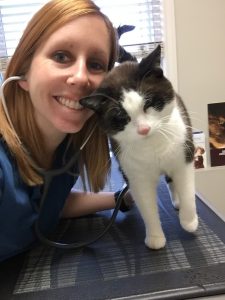Julie Munro, RVT
Where did you go to school and what made you decide to take a Veterinary Technology program?
I’ve loved animals and nature for as long as I can remember. Having a career that didn’t involve those things never even crossed my mind! That’s why pursuing a career as an RVT was an obvious choice for me. After completing my Veterinary Technician diploma at Seneca College in 2008, I returned a few years later to complete their Advanced Wildlife Technician certificate.
Where are you employed currently and how long have you been there?
I recently started working at the Georgian Bay Turtle Hospital, a non-profit organization that rehabilitates injured turtles and promotes turtle conservation. I started volunteering with them last summer, collecting and incubating turtle eggs, and helping turtles that had minor injuries. At the end of the summer, I was offered a job as an RVT in their animal care department, where I provide care to the Hospital’s resident animals over the winter. Next spring, I’ll return to participating in conservation efforts with the Hospital and hope to help out with field research projects.
What’s a typical day like for you?
In addition to my feeding and cleaning responsibilities, I also perform health exams and help with medical treatments for the resident animals that cannot be released into the wild. These animals include a variety of species of Ontario turtles and snakes, along with some surrendered exotic pets, including a Fly River Turtle, a green iguana, and a variety of geckos.
If this isn’t your first job as an RVT, what other roles have you had in the RVT field?
For the first 10 years of my career, I worked at a small animal practice. After that, I moved around for a bit, doing some part-time, weekend work at an emergency hospital, and also spent time working in the oncology department at a large hospital.
For a number of years, I volunteered at Procyon Wildlife, a registered charity in Beeton, Ontario, that’s dedicated to rescuing, rehabilitating, and safely releasing orphaned and injured wildlife. Most recently, I spent a month in Lesmurdie, Western Australia, volunteering at Kanyana Wildlife Rehabilitation Centre. While I was there, I fed and cared for their non-releasable resident animals, but was also allowed to help in the hospital providing treatments to sick or injured patients, because of my experience as an RVT. Being able to work with animals that are native to Australia, such as echidnas, wallabies, and bilbies was a fantastic experience that I’ll treasure forever.
What do you think are the best skills or traits that you bring to your role as an RVT?
My passion and compassion. Everyone who is an RVT knows how draining this job can be emotionally, physically, and financially, but having the passion to keep going along this career path is what makes a great RVT. I have spent many extra hours, as we all have, staying late to help out a patient that came in just before closing and needed immediate care, or working weekends and holidays away from my family to help someone else’s fur baby. I have dedicated countless hours volunteering just to gain knowledge and new experiences. I was fortunate enough to spend a month this past September, volunteering at a wildlife rehab centre in Australia, which was the trip of a lifetime. Using my skills as an RVT to assist with treatments and care for animals that are unique to that region, is something I’ll never forget. Knowing that RVTs can enjoy opportunities like this, pretty much anywhere in the world, is truly amazing.
What are you most proud of in your career?
I am most proud of how hard I have worked and all that I have accomplished. I was not a very confident person growing up, and going into this field, I didn’t realize how much I would need to speak to people and share my knowledge with them. I’m amazed at how much I’ve grown when it comes to dealing with pet parents or visitors to the wildlife centers and the Hospital. I think because I’m able to do the thing I love, some of the fears and nerves I used to have, have faded away.
I am also proud of how many other RVTs I have helped grow in their careers over the years. Training new grads and sharing my knowledge and ‘tips and tricks’ is really rewarding.
Who was your greatest mentor (teacher, manager, colleague, etc.) who helped get you to where you are today in your career?
Hollie, an RVT who graduated a few years before me, was working at the clinic I started at when I was a new RVT. She helped me gain confidence and taught me so many things. Her passion for animals is as great as mine and she remains one of my best friends to this day.
Who has inspired you in your career as an RVT, and how?
Many years ago, I helped train a new RVT by the name of Alex. She was always so enthusiastic about her job at the small animal clinic we were at, but was also interested in the area of emergency medicine. She decided to challenge herself by leaving her position working in a regular practice to pursue her goal of working in an emergency clinic. She’s now a head RVT at an emergency hospital, who also trains new staff and co-op students. Not only is she one of my best friends, but she is proof that if you want something, you need to put yourself out there and just go for it.



